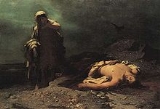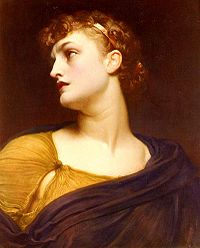
Antigona
Encyclopedia
Antigona is an opera
in three acts in Italian
by the composer Tommaso Traetta
. The libretto, by Marco Coltellini
, is based on the tragedy Antigone by Sophocles
.
, Russia
on 11 November 1772.
.jpg)
.png)
. Oedipus has been expelled from Thebes, the city where he was king, after it was revealed he had killed his father and married his mother. He left four children: Eteocles
, Polynices
, Antigone
and Ismene
. Creon
, Oedipus' brother-in-law, declares that the vacant throne of Thebes will now be shared by the two sons, Eteocles and Polynices, ruling alternately, but the two have quarrelled. To prevent a war, Creon decrees the two should fight in single combat to decide who will be king.
dancers) fight the single combat and kill each other. Adrastus now offers the crown to Creon, who declares that Eteocles shall be buried with full honours. Polynices, however, will be left unburied because he started a war on Thebes when he did not get his way. Polynices' sisters, Antigone and Ismene, are distraught. Antigone resolves to bury her brother in defiance of Creon's decree. Ismene hopes that Creon's son Haemon (who is in love with Antigone) will be able to persuade his father to show mercy to the dead Polynices.
 Antigone cremates Polynices by night. Haemon comes to warn her just before Adrastus and his guards arrive. Adrastus realises Creon's orders have been disobeyed. He believes Haemon is the culprit and arrests him. Creon sentences him to death, but Antigone arrives to explain that the cremation is all her own work. Creon condemns her to be walled up alive in a cave.
Antigone cremates Polynices by night. Haemon comes to warn her just before Adrastus and his guards arrive. Adrastus realises Creon's orders have been disobeyed. He believes Haemon is the culprit and arrests him. Creon sentences him to death, but Antigone arrives to explain that the cremation is all her own work. Creon condemns her to be walled up alive in a cave.
Opera
Opera is an art form in which singers and musicians perform a dramatic work combining text and musical score, usually in a theatrical setting. Opera incorporates many of the elements of spoken theatre, such as acting, scenery, and costumes and sometimes includes dance...
in three acts in Italian
Italian language
Italian is a Romance language spoken mainly in Europe: Italy, Switzerland, San Marino, Vatican City, by minorities in Malta, Monaco, Croatia, Slovenia, France, Libya, Eritrea, and Somalia, and by immigrant communities in the Americas and Australia...
by the composer Tommaso Traetta
Tommaso Traetta
Tommaso Michele Francesco Saverio Traetta was an Italian composer.-Biography:Traetta was born in Bitonto, a town near Bari, near the top of the heel of the boot of Italy. He eventually became a pupil of the composer, singer and teacher Nicola Porpora in Naples, and scored a first success with his...
. The libretto, by Marco Coltellini
Marco Coltellini
Marco Coltellini was an Italian opera librettist and printer.He was probably born in Livorno and embarked on a career in the Church, but had to leave after fathering four daughters. He set up a printing shop in Livorno to publish the works of Enlightenment figures such as Francesco Algarotti and...
, is based on the tragedy Antigone by Sophocles
Sophocles
Sophocles is one of three ancient Greek tragedians whose plays have survived. His first plays were written later than those of Aeschylus, and earlier than or contemporary with those of Euripides...
.
Performance history
Antigona received its premiere at the Imperial Theatre, Saint PetersburgSaint Petersburg
Saint Petersburg is a city and a federal subject of Russia located on the Neva River at the head of the Gulf of Finland on the Baltic Sea...
, Russia
Russia
Russia or , officially known as both Russia and the Russian Federation , is a country in northern Eurasia. It is a federal semi-presidential republic, comprising 83 federal subjects...
on 11 November 1772.
Roles
.jpg)
| Cast | Voice type | Premiere, 1772 |
|---|---|---|
| Antigona (Antigone) | soprano Soprano A soprano is a voice type with a vocal range from approximately middle C to "high A" in choral music, or to "soprano C" or higher in operatic music. In four-part chorale style harmony, the soprano takes the highest part, which usually encompasses the melody... |
Caterina Gabrielli |
| Ismene | soprano | Francesca Gabrielli |
| Creonte (Creon) | tenor Tenor The tenor is a type of male singing voice and is the highest male voice within the modal register. The typical tenor voice lies between C3, the C one octave below middle C, to the A above middle C in choral music, and up to high C in solo work. The low extreme for tenors is roughly B2... |
Antonio Prati |
| Emone (Haemon) | castrato Castrato A castrato is a man with a singing voice equivalent to that of a soprano, mezzo-soprano, or contralto voice produced either by castration of the singer before puberty or one who, because of an endocrinological condition, never reaches sexual maturity.Castration before puberty prevents a boy's... |
Angiolo Monanni |
| Adrasto (Adrastus) | tenor | Antonio Amati |
Synopsis
.png)
Background
The background to the opera is the myth of OedipusOedipus
Oedipus was a mythical Greek king of Thebes. He fulfilled a prophecy that said he would kill his father and marry his mother, and thus brought disaster on his city and family...
. Oedipus has been expelled from Thebes, the city where he was king, after it was revealed he had killed his father and married his mother. He left four children: Eteocles
Eteocles
In Greek mythology, Eteocles was a king of Thebes, the son of Oedipus and either Jocasta or Euryganeia. The name is from earlier *Etewoklewes , meaning "truly glorious". Tawaglawas is thought to be the Hittite rendition of the name. Oedipus killed his father Laius and married his mother without...
, Polynices
Polynices
In Greek mythology, Polynices or Polyneices was the son of Oedipus and Jocasta. His wife was Argea. His father, Oedipus, was discovered to have killed his father and married his mother, and was expelled from Thebes, leaving his sons Eteocles and Polynices to rule...
, Antigone
Antigone
In Greek mythology, Antigone is the daughter of Oedipus and Jocasta, Oedipus' mother. The name may be taken to mean "unbending", coming from "anti-" and "-gon / -gony" , but has also been suggested to mean "opposed to motherhood", "in place of a mother", or "anti-generative", based from the root...
and Ismene
Ismene
Ismene is the name of two women of Greek mythology. The more famous is a daughter and half-sister of Oedipus, daughter and granddaughter of Jocasta, and sister of Antigone, Eteocles, and Polynices. She appears in several plays of Sophocles: at the end of Oedipus the King, in Oedipus at Colonus and...
. Creon
Creon
Creon is a figure in Greek mythology best known as the ruler of Thebes in the legend of Oedipus. He had two children with his wife, Eurydice: Megareus and Haemon...
, Oedipus' brother-in-law, declares that the vacant throne of Thebes will now be shared by the two sons, Eteocles and Polynices, ruling alternately, but the two have quarrelled. To prevent a war, Creon decrees the two should fight in single combat to decide who will be king.
Act One
Eteocles and Polynices (played by balletBallet
Ballet is a type of performance dance, that originated in the Italian Renaissance courts of the 15th century, and which was further developed in France and Russia as a concert dance form. The early portions preceded the invention of the proscenium stage and were presented in large chambers with...
dancers) fight the single combat and kill each other. Adrastus now offers the crown to Creon, who declares that Eteocles shall be buried with full honours. Polynices, however, will be left unburied because he started a war on Thebes when he did not get his way. Polynices' sisters, Antigone and Ismene, are distraught. Antigone resolves to bury her brother in defiance of Creon's decree. Ismene hopes that Creon's son Haemon (who is in love with Antigone) will be able to persuade his father to show mercy to the dead Polynices.
Act Two

Act Three
Creon and the Thebans watch as Antigone is walled up in the cave. Adrastus brings news that Haemon has apparently committed suicide. Creon hurries back to Thebes. But Haemon has survived and reaches the cave where he intends to die with Antigone. He manages to reach her through a fissure in the rock. He shows the dagger he has brought which will enable them both to have a quick death and avoid slow starvation. At that moment there is a noise as soldiers break down the wall. Creon has repented his action and repealed the death sentence. He asks Antigone and Haemon to forgive his harshness. The opera ends with a marriage ceremony for the two rescued lovers.Recording
- Antigona Maria Bayo, Anna Maria Panzarella, Carlo Vicente Allemano, Laura Polverelli, Gilles Ragon, Les Talens Lyriques, conducted by Christophe RoussetChristophe RoussetChristophe Rousset is a French harpsichordist and conductor, specializing in the performance of baroque music on period instruments.-Biography:...
(Decca, 2000)
Sources
- Viking Opera Guide ed. Holden (Viking, 1993)
- Amadeus Online

